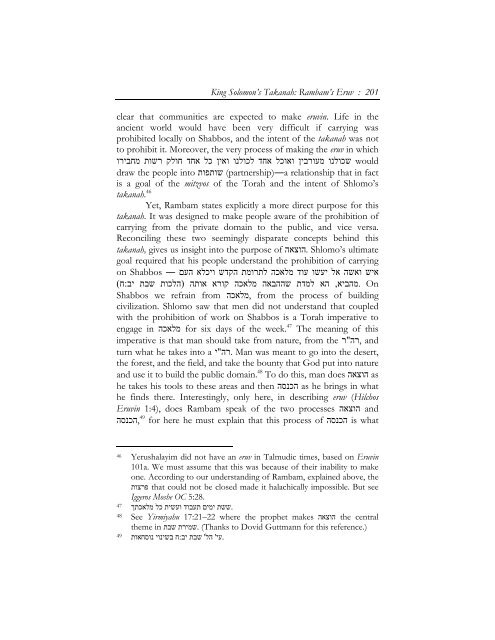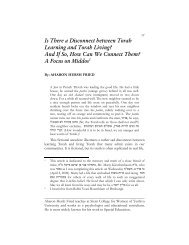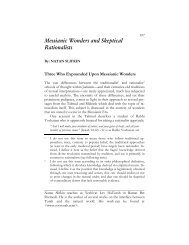King Solomon's Takanah: Rambam's Eruv - Hakirah.org
King Solomon's Takanah: Rambam's Eruv - Hakirah.org
King Solomon's Takanah: Rambam's Eruv - Hakirah.org
You also want an ePaper? Increase the reach of your titles
YUMPU automatically turns print PDFs into web optimized ePapers that Google loves.
<strong>King</strong> Solomon’s <strong>Takanah</strong>: Rambam’s <strong>Eruv</strong> : 201<br />
clear that communities are expected to make eruvin. Life in the<br />
ancient world would have been very difficult if carrying was<br />
prohibited locally on Shabbos, and the intent of the takanah was not<br />
to prohibit it. Moreover, the very process of making the eruv in which<br />
would<br />
draw the people into שותפות (partnership)―a relationship that in fact<br />
is a goal of the mitzvos of the Torah and the intent of Shlomo’s<br />
takanah. 46 Yet, Rambam states explicitly a more direct purpose for this<br />
takanah. It was designed to make people aware of the prohibition of<br />
carrying from the private domain to the public, and vice versa.<br />
Reconciling these two seemingly disparate concepts behind this<br />
takanah, gives us insight into the purpose of וצאה . Shlomo’s ultimate<br />
goal required that his people understand the prohibition of carrying<br />
שכולנו<br />
ה<br />
מעורבין ואוכל אחד לכולנו ואין כל אחד חולק רשות מחבירו<br />
איש ואשה אל יעשו עוד מלאכה לתרומת הקדש ויכלא העם ― Shabbos on<br />
מהביא, הא למדת שההבאה מלאכה קורא אותה (הלכות שבת יב:ח<br />
( . On<br />
Shabbos we refrain from ,מלאכה from the process of building<br />
civilization. Shlomo saw that men did not understand that coupled<br />
with the prohibition of work on Shabbos is a Torah imperative to<br />
engage in מלאכה for six days of the week. 47 The meaning of this<br />
imperative is that man should take from nature, from the "ר , and<br />
turn what he takes into a "י .רה Man was meant to go into the desert,<br />
the forest, and the field, and take the bounty that God put into nature<br />
and use it to build the public domain. 48 To do this, man does הוצאה as<br />
he takes his tools to these areas and then הכנסה as he brings in what<br />
he finds there. Interestingly, only here, in describing eruv (Hilchos<br />
<strong>Eruv</strong>in 1:4), does Rambam speak of the two processes הוצאה and<br />
is what הכנסה 49 for here he must explain that this process of ,הכנסה<br />
רה<br />
46 Yerushalayim did not have an eruv in Talmudic times, based on <strong>Eruv</strong>in<br />
101a. We must assume that this was because of their inability to make<br />
one. According to our understanding of Rambam, explained above, the<br />
that could not be closed made it halachically impossible. But see פרצות<br />
Iggeros Moshe OC 5:28.<br />
.ששת ימים תעבוד ועשית כ ל מלאכתך 47<br />
48 See Yirmiyahu 17:21–22 where the prophet makes הוצאה the central<br />
theme in שבת .שמירת (Thanks to Dovid Guttmann for this reference.)<br />
. ' הל' שבת יב: ח בשינוי נוסחאות<br />
עי 49
















